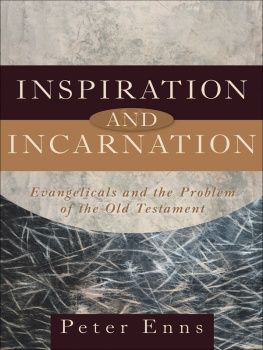
2014 Michael Graves
All rights reserved
Published 2014 by
Wm. B. Eerdmans Publishing Co.
2140 Oak Industrial Drive N.E., Grand Rapids, Michigan 49505 /
P.O. Box 163, Cambridge CB3 9PU U.K.
www.eerdmans.com
Printed in the United States of America
20 19 18 17 16 15 14 7 6 5 4 3 2 1
Library of Congress Cataloging-in-Publication Data
Graves, Michael, 1973
The inspiration and interpretation of scripture: perspectives from the early church /
Michael Graves.
pages cm
Includes bibliographical references and indexes.
ISBN 978-1-4674-4043-1 (pbk.: alk. paper)
Bible Inspiration History of doctrines Early church, ca. 30-600.
Bible Hermeneutics History. 3. Bible Criticism, interpretation, etc.
History Early church, ca. 30-600. I. Title.
BS480.G73 2014
220.1309015 dc23
2013029794
Scripture quotations are from The Holy Bible, English Standard Version, copyright 2001 by Crossway Bibles, a division of Good New Publishers. Used by permission. All rights reserved.
For Ben and Nick
Contents
Scripture has held a central place in Christianity from the origins of the church two thousand years ago up to the present day. The original message that the apostles taught about Jesus was grounded in the Scriptures, which at that time consisted only of the Old Testament. The apostle Paul explained the scriptural basis of his message in this way: For I delivered to you as of first importance what I also received: that Christ died for our sins in accordance with the Scriptures, that he was buried, that he was raised on the third day in accordance with the Scriptures, and that he appeared to Cephas, then to the twelve (1 Cor. 15:3-5). The Gospel of Matthew records numerous events in the life of Jesus that took place in order to fulfill what the Lord had spoken through an Old Testament prophet (Matt. 1:22; 2:15, 17, 23, etc.). The early church inherited from ancient Judaism and from the apostles the belief that God had communicated with humanity through sacred writings known as Scripture. Over time, as the New Testament documents came to be read in the churches alongside the Old Testament, Christians began to recognize a canon of sacred writings consisting of both the holy books of ancient Israel (the Old Testament) and the authoritative writings of the apostles (the New Testament). Together, these texts made up the Christian Bible, which has been read, preached, and prayed over since the first centuries of the church.
What makes the Bible so special to Christians is the belief that it is uniquely inspired by God. It is true that sometimes we talk about other writings as being inspired. A novel may be inspired by a persons life, or we may even say that an author was inspired by a sense of beauty or won
The present book aims to describe what Christians in the first five centuries of the church believed about the inspiration of Scripture. I will do this by identifying various ideas that early Christians considered to be logical implications of biblical inspiration. In other words: What is true of Scripture as a result of its being inspired? What should divine inspiration cause us to expect from Scripture? The answers to these questions in the early church related not only to the nature of Scriptures truth claims, but also to the manner in which Scripture was to be interpreted and the possible standards by which scriptural interpretation could be measured. These dimensions of Scripture were closely interrelated in a variety of ways.
Sadly the views of the average Christian during this period are difficult to reconstruct. But we can grasp the basic shape of early Christian beliefs about Scripture through the writings of Christian intellectuals, including many bishops, known commonly as the Church Fathers. This masculineoriented phrase reflects the unfortunate fact that men rather than women generally had opportunities to engage in written biblical interpretation during this period. Moreover, the writings women did produce did not survive. For example, in the late fourth century Jerome exchanged letters devoted mostly to biblical topics with a woman named Marcella, an ascetic leader in Rome. Marcella studied Hebrew and is reported to have answered questions put to her by priests on scriptural matters. This is typical of womens writings in the first several centuries of the church. As a result, the figures studied in this book will by necessity be the Church Fathers.
I am of course writing as one who is situated in the modern world, and I cannot help but reflect my own situation in time. But my goal in describing these ancient authors will be to present their perspectives in their own terms as they formulated them within their historical contexts. Even as I seek to identify widely held beliefs, I will also take note of diversity in viewpoint where it existed. In fact, some of the major conceptual categories that I will discuss are in tension with one another, revealing differences of opinion as to the implications of inspiration. What I am trying to describe is not a coherent, systematic doctrine of biblical inspiration that was shared by all early Christians, but rather the network of ideas about inspiration reflected in early Christian writings. This network has identifiable benchmarks but also diverse trajectories.
In the course of describing what ancient Christians thought about biblical inspiration, I will try to identify some important insights that may be helpful for Christians today. I believe that the Church Fathers have much to teach us about how to understand Scripture. At the same time, there are many ideas found in their writings that reflect their ancient context; these ideas may no longer seem credible or meaningful today, at least not as they were originally formulated. But when proper account is taken of the intellectual environment within which the Church Fathers lived, many of their beliefs about Scripture prove to be not only helpful but even essential for contemporary Christians who want to read Scripture and hear its divine message. Early Christian ideas about inspiration illuminate the various ways that Scripture is meaningful for Christian readers. It is the ever-present Christian significance of Scripture that takes center stage with the Church Fathers. In the Conclusion to this book, I will suggest some ways that Christians today might be able to learn from the early church while at the same time respecting the differences between the ancient and modern contexts.
In the remainder of the Introduction I will describe some of the major conceptual and scriptural challenges that confront us in defining the nature of inspiration, provide some historical context for ancient thinking about sacred texts, and briefly introduce the major Christian figures to be discussed in the chapters to follow.
In logic the term entailment refers to the relationship between two statements, where the second is necessarily true in logical consequence of the first being true. Consider these two sentences: (1) Marcus has been hired as commander of the army. (2) Marcus has a job. If Marcus has been hired to serve as commander of the army, then it logically follows that he has a job. Provided that we are using these words in their most commonly accepted senses, the second statement is necessarily true if the first is true. Not only can the word entailment be used to describe the relationship between such statements, but the second, logically necessary statement can be called an entailment of the first. For example, if the above statements about Marcus were true, then the fact that Marcus has a job is an entailment of the fact that he has been hired as commander of the army. Thus, an entailment is some proposition or quality that necessarily accompanies another proposition or quality.
Next page
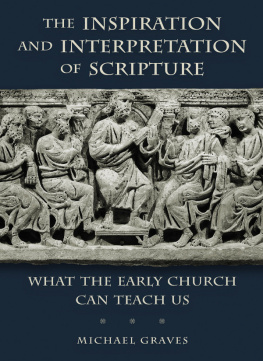
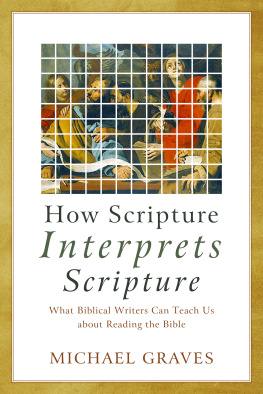

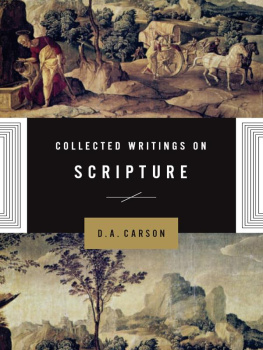

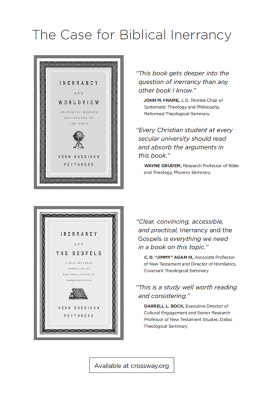
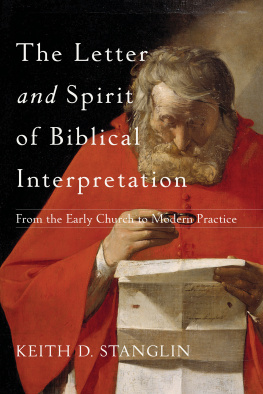

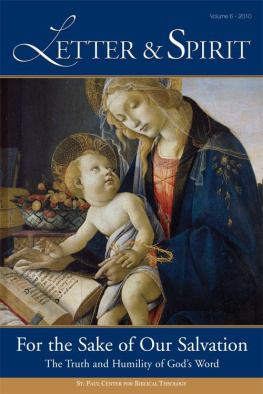
![Scott Hahn [Inconnu(e)] - Scripture Matters: Essays on Reading the Bible From the Heart of the Church](/uploads/posts/book/134760/thumbs/scott-hahn-inconnu-e-scripture-matters-essays.jpg)
